The Inter-American Development Bank’s (IDB) Caribbean Department has published its most recent Caribbean Quarterly Bulletin focused on the evolving economic and human consequences of the COVID-19 outbreak for the region. This edition builds on work outlined in the previous edition, while taking a deeper look at: (i) the evolution of the virus, preventative measures, and travel restrictions across the region; (ii) the economic, employment, and balance of payments implications of the crisis for Caribbean economies; and, (iii) results of a recent survey of the socio-economic implications of the crisis, including for the most vulnerable populations. Highlights from the publication are outlined below.
And the Pandemic saga continues…
This second special edition of the IDB Caribbean Quarterly Bulletin provides an update of economic conditions in the region. It also focuses on important evolving issues, including:
- Economic forecasts for 2020 have worsened substantially. In line with simulations from the last Quarterly Bulletin, the economies most heavily dependent on tourism—The Bahamas and Barbados—could experience double-digit declines in GDP this year. Commodity exporters, with the exception of Guyana, are likely to experience single-digit declines in GDP this year due to the domestic containment shock and lower prices for key commodities.
- Balance of payments disequilibria remain a concern. Tourism receipts constitute a large share of export earnings, leading to the potential for double-digit impacts on the balance of payments. A key unknown is how demand is evolving in response to the tourism decline and economic shock.
- The social impacts of the ongoing crisis are significant. Simulations of the employment impact of tourism shocks provide a sobering perspective. In addition, evidence provided by an online survey carried out in April reveal[1] that for households earning less than the minimum wage, a striking 34 percent of respondents had gone hungry in the previous week, and just over half stated that they had consumed less healthy food. About 60 percent of low-income households reported a job loss in the household. There are important gender dimensions as well: job losses and nutritional outcomes were worse for women, and some women reported an increase in domestic violence.
You can listen more of our podcasts here.
Importance of Tourism
Tourism was adversely affected during the first quarter of 2020 as the crisis began to unfold, and the sector was effectively shut down during the second quarter as complete travel prohibitions came into place.[2] Expectations for the third quarter remain uncertain, but prospects for a rapid return to pre-crisis levels of demand remain grim. Nearly a dozen Caribbean countries—including the six Organization of Eastern Caribbean States (OECS) sovereign countries[3], as well as The Bahamas, Barbados, and Jamaica—rank in the top 20 on our new global index of economic dependence on the sector, dubbed the Tourism Dependency Index (TDI). The TDI is calculated for 166 countries worldwide for which data were available. The range is from zero to 100, with 100 representing total dependence on the sector. Index results for 35 countries in Latin America and the Caribbean for which data were available are shown in Figure 1, with the countries analyzed in this Quarterly Bulletin highlighted in red.
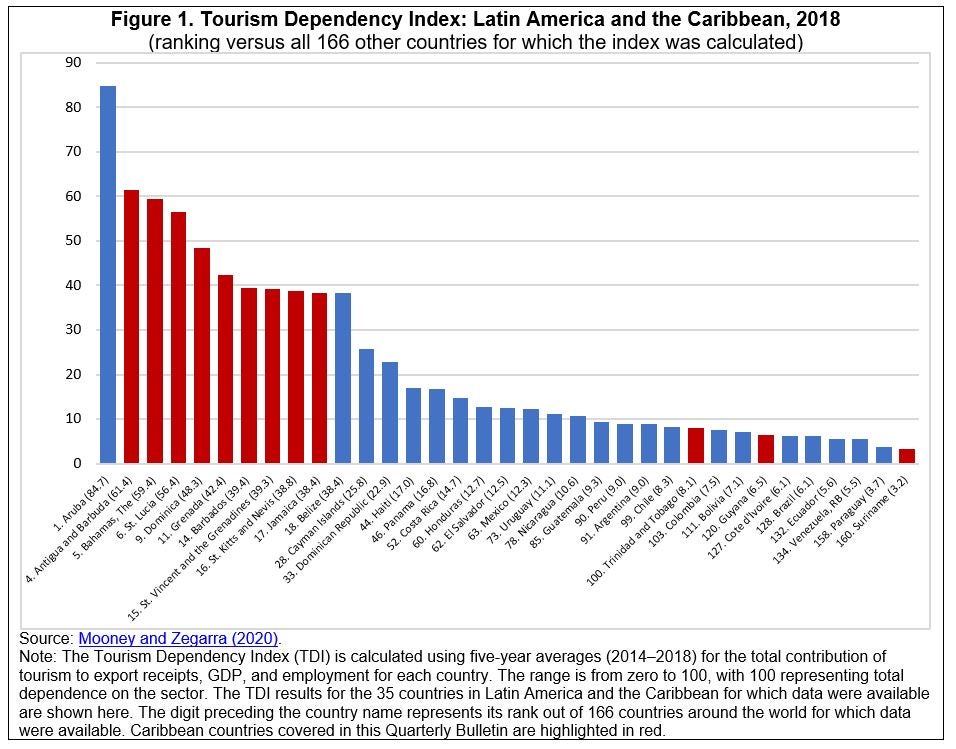
Indicators of Tourism Dependence: Caribbean countries are among the world’s most dependent on tourism with respect to the three critical variables included in the TDI index. For example, over three-quarters of export receipts are linked to tourism in Antigua and Barbuda, The Bahamas, Dominica, and Grenada (Table 1). Similarly, the total contribution of tourism is 40 percent or more in terms of both GDP and employment for Antigua and Barbuda, The Bahamas, St. Lucia, and Barbados. Taken together, this suggests that the Caribbean could be the most adversely affected region in the world in terms of the economic impact of COVID-19.
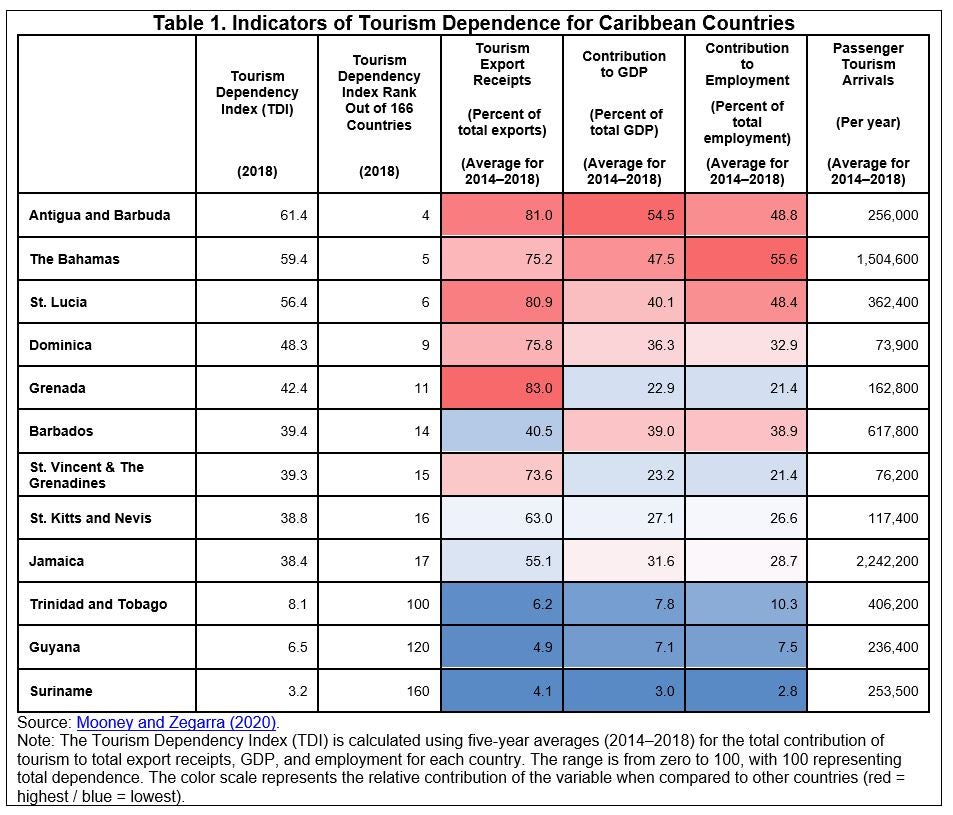
Tourism Shock Simulations—Without Historical Precedent: Our previous Quarterly Bulletin explored shocks to GDP from the crisis. This edition develops and applies shock scenarios representing plausible expectations for the evolution of tourism to employment and exports. Even the most benign scenarios—reflecting a deceleration of tourism flows relative to 2019 of between 44 and 69 percent—illustrate that the crisis-driven shock to tourism flows is likely to be an order of magnitude greater than any in recent history (Figure 2.a).
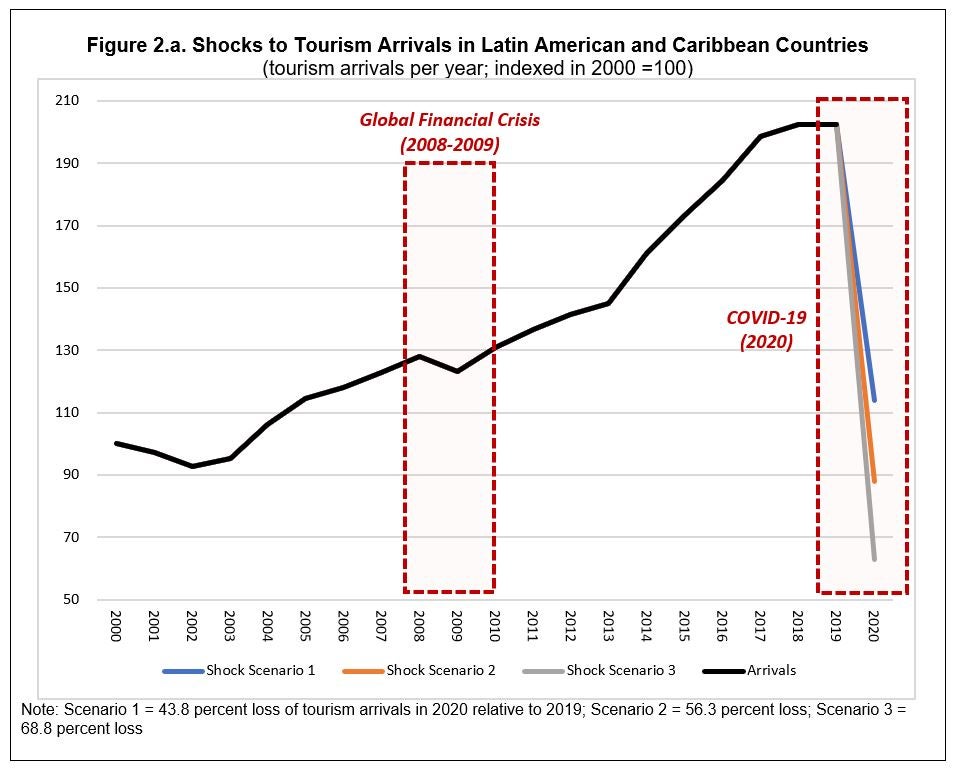
- Shocks to Employment: For Caribbean countries that are most dependent on tourism, such as The Bahamas and St. Lucia, anywhere from 12 percent (Scenario 1) to as much as 20 percent of the labor force (Scenario 3) could be adversely affected by the pandemic (Figure 2.b). It is worth noting that these shocks have been applied to the direct contribution of the tourism industry to employment, which does not take into account other sectors (e.g., retail, services, construction) that are likely to be adversely affected by the loss of jobs and purchasing power for those working directly in tourism. Taken together, these and related exercises underscore the human dimensions of this crisis—many individuals and households in the region will suffer, implying severe social costs that are difficult to capture with economic aggregates.
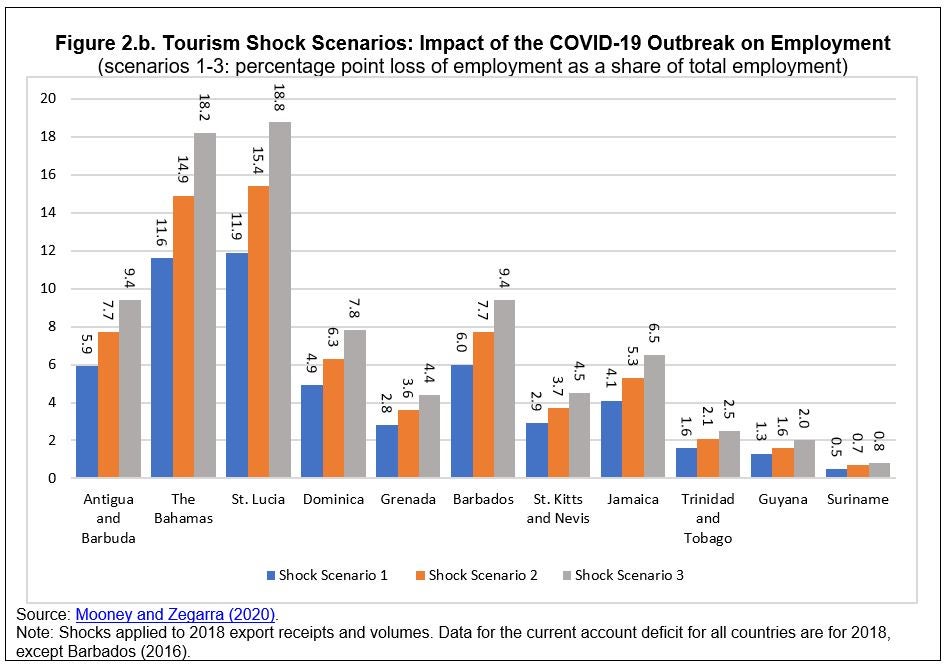
- Shocks to Exports: The publication also illustrates the potentially devastating implications of the crisis for exports—particularly tourism receipts—and the balance of payments. Countries in the region that depend on external demand have and will continue to experience unprecedented losses of foreign exchange inflows, that have been crucial in terms of their role in financing imports, servicing external liabilities, and supporting exchange rates. Scenarios presented in the publication underscore the importance of vigilance and proactive action on the part of governments and private sectors to avoid a disorderly adjustment.
Social Impacts of the Crisis
The IDB’s Research Department and Caribbean economics team joined forces to collect and analyze new survey data[4] for the period April 16–30, based on responses from about 12,500 households. This unique dataset provides striking insights into the social and nutritional impacts of the crisis, as well as with respect to employment.
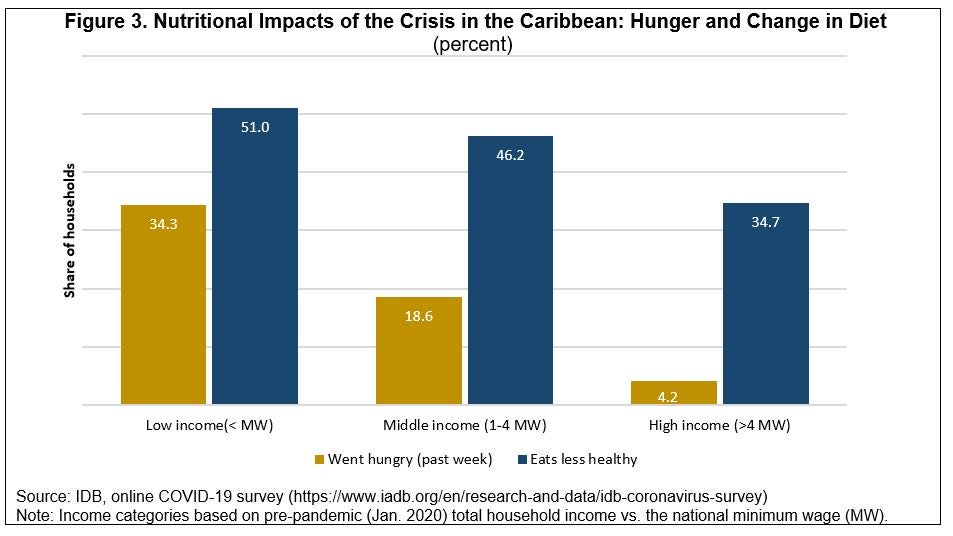
Nutritional Impacts of the Crisis: For households earning less than the minimum wage, a striking 34.3 percent of respondents declared that they had gone hungry in the previous week, and just over half stated that they consumed less healthy food (Figure 3). These issues even persist, at substantially lower levels, in the higher-income categories.
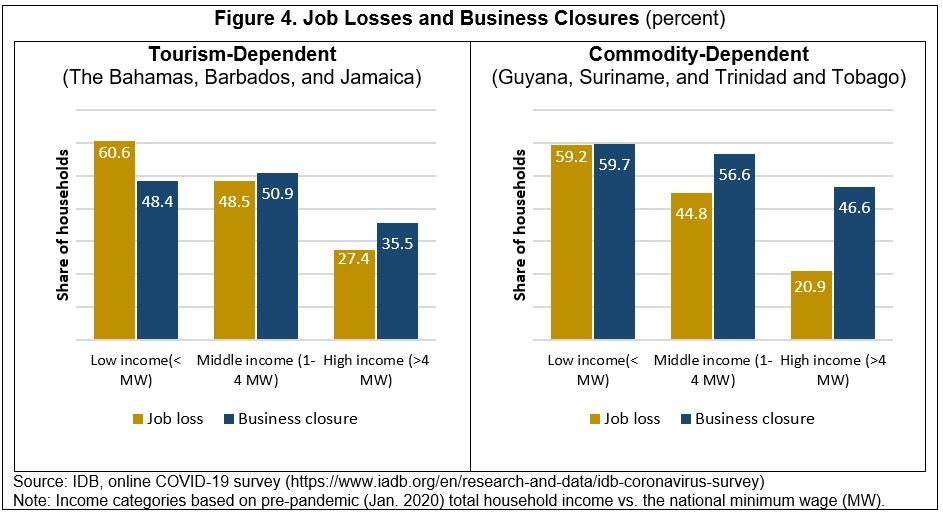
Labor Market Impacts of the Crisis: Labor market outcomes have also been dramatic, with job losses and business closures for business owners reported at a high level in both tourism- and commodity-dependent economies (Figure 4). The numbers are worse for the poor—with about 60 percent of low-income households surveyed reporting job losses.
Gender Dimensions of the Crisis: According to survey responses, outcomes have been worse for female-headed households than for male-headed households. Job losses and nutritional outcomes are two examples, and the gaps are large. In addition, some women have also reported an increase in domestic violence.
Country Specific Chapters
The report also includes country-specific sections focused on the implications for of the crisis for economic performance, as well as policy measures that have been announced and undertaken by governments in The Bahamas, Barbados, Guyana, Jamaica, Suriname, Trinidad and Tobago, as well as the six sovereign member states of the OECS. In the report, our country economists review policy options that remain available, and provide advice regarding some of the most promising, within the context of constraints facing policymakers.
[1] The survey is available at https://www.iadb.org/en/research-and-data/idb-coronavirus-survey
[2] The UN World Tourism Organization estimates that global tourism flows fell by over 20 percent in the first quarter of 2020. See https://www.unwto.org/news/covid-19-international-tourist-numbers-could-fall-60-80-in-2020.
[3] Antigua and Barbuda, Dominica, Grenada, St. Lucia, St. Vincent and the Grenadines, and St. Kitts and Nevis.
[4] The aggregates presented here are for the six Caribbean countries covered in this Quarterly Bulletin.


Leave a Reply